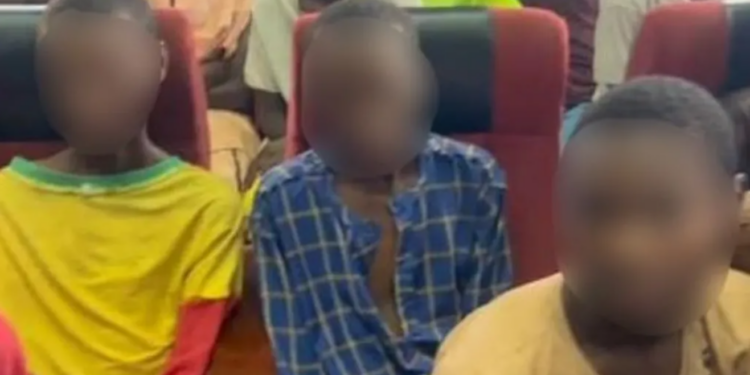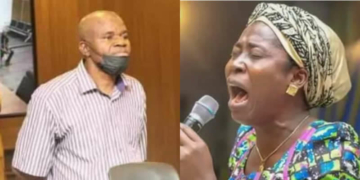Children have had to bear the brunt of protest in Nigeria, with a vivid display of 119 protesters being arraigned in the Abuja Federal High Court a day before the Nov. 2 International Day of Non-Violence. Amongst these protesters were 32 minors who were also arrested during the August ten-day protest tagged #EndBadGovernance, which saw violence in some parts of the country in response to a growing economic hardship.
They have been in prison since their arrest by operatives of the Nigeria Police Force at several locations in Abuja, Gombe, Jos, Kano, and Kaduna. They were arraigned on ten counts, including treasonable felony and destruction of public property.
Before their arraignment at the high court, they spent three months in custody, breaching existing laws, including the Child right Acts 2003, which explicitly states in section 204 that “ No child shall be subjected to the criminal justice process or to criminal sanctions, but a child alleged to have committed an act which would constitute a criminal offence if he were an adult shall be subjected only to the child justice system.”
As the court commenced proceedings, one could see how malnourished these children were. Available videos from the court displayed a stark reality of the Nigerian state— a hungry population struggling to afford food. Sadly, these children bore the brunt of speaking up and were not even adequately fed while in detention.
In the courtroom, they were seen hastily eating right there in the dock, seemingly oblivious to their surroundings, with their focus divided between their food and the proceedings, clearly revealing the hardship they’ve endured. And then, five of them fainted, halting proceedings for a while.
The government, however, came under heavy criticism from Nigerians and civil society bodies who tagged their action as a breach of existing laws and a dent in Nigeria’s global image.
They Are Not Minors, FG Counsel Says Blindly
Under the Child Rights Act of 2003, a child is defined as someone who has not attained the age of 18, but the federal government believes otherwise. Among the 119 protesters arraigned were 32 minors from the age of 13. However, the counsel for the Nigerian government, Rimazonte Ezekiel, refuted the claim that they are minors, alleging instead that they are married men.
“All of these boys that we brought to the court today are adults. Most of them are married men; none of them is a minor. Some of them are university graduates,” the counsel said. “The small kids you see here came with their parents to greet their loved ones. They are not even the real suspects standing trial in this case.”
He added, “These boys were arrested in Kaduna and Zaria. These boys were using the Russian flag and calling on the military to remove our president.”
Meanwhile, the governor of Kano State, Abba Yusuf, stated that he was not aware of the arrest of dozens of minors arraigned at the Federal High Court in Abuja.
In response to these events, the police justified the arrest and arraignment of minors. According to the spokesperson of the Nigeria Police Force (NPF), Muyiwa Adejobi, children above the age of seven can be charged in court. This contradicts the statement by the government’s counsel, who told journalists that there were no minors among the arraigned protesters.
Muyiwa clarified that children under seven are exempt from criminal liability under the law, emphasising that the individuals arraigned are 13-year-olds and above.
Tinubu Frees Arraigned Protesters After Hard Knocks
At the resumption of proceedings on Tuesday, Oct. 5, the Director of Public Prosecution of the Federation, Federal Ministry of Justice, Abubakar Babadoko, appeared in court on behalf of the Attorney General of the Federation. He informed the presiding Justice, Egwuatu, that the Federal Government had decided to take over the case from the Inspector General of Police and discontinue it under Section 174 of the 1999 Constitution.
According to available reports, this directive came from President Tinubu on Oct. 4 following widespread backlash from Nigerians– the same day, the Civil Society Legislative Advocacy Centre (CISLAC) condemned the detention of minors. In a statement signed by its Executive Director, Auwal Musa Rafsanjani, the organisation called on First Lady Senator Oluremi Tinubu to intervene, urging her to view these young detainees as “her children.”
CISLAC noted that the treatment of these minors is both disturbing and damaging to Nigeria’s global image, as they were only exercising their constitutional rights. The organisation argued that their detention violates national and international human rights standards.
After the court set bail at N10 million for each defendant, their counsel, Femi Falana (SAN), filed a preliminary objection, arguing that the court lacked jurisdiction over the case. He emphasised that, according to Section 18(3) of the 1999 Constitution, Section 15 of the Child Rights Act, Section 2 of the Universal Basic Education Act, and Article 17 of the African Charter, minors should not be subjected to criminal trials.
Falana stressed that both national and international laws protect the rights of these minors, calling on the government to fulfil its duty and provide for their education instead.
After their eventual release, Falana threatened to take the Federal Government to court if these minors were not reintegrated and sent to school, relying on the legal provisions in the 1999 Constitution, the Child Rights Act, and the Universal Basic Education Act.
Protest Is Now Dangerous In Nigeria
Nigeria is gradually becoming a no-protest zone, as anyone who dares to protest in the streets risks arrest, detention, and sometimes death on the protest grounds. Citizens have yet to recover from the historic #EndSARS movement, which took place across the country from Oct. 8, 2020, primarily led by young people. This movement, now commemorated annually, claimed the lives of 56 people, left scores badly injured, and resulted in many arrests.
The Nigerian state cracked down on the #EndSARS protesters, ordering military and police operatives to open live rounds on peaceful demonstrators.
The attacks on protesters have persisted, with demonstrators facing violence even during peaceful demonstrations. In an interview with Vanguard, Tony Ojukwu, a Senior Advocate of Nigeria (SAN) and Executive Secretary of the National Human Rights Commission (NHRC), reported that 27 protesters were killed by police, and about 800 people were arrested during the August #EndBadGovernance protests across the country.
Despite Attacks, Peaceful Protest Remains a Right
Two Sections of the Constitution of the Federal Republic of Nigeria guarantee the right to protest. The first is Section 39 (1), which provides for the right to freedom of expression and the press. It states: “Every person shall be entitled to freedom of expression, including freedom to hold opinions and to receive and impart ideas and information without interference.”
The second is Section 40, which guarantees freedom of association and peaceful assembly. It states “Every person shall be entitled to assemble freely and associate with other persons, and in particular he/she may form or belong to any political party, trade union or any other association for the protection of his interests.”
Under regional law, the African Charter on Human and Peoples Rights, Article 9 provides for the right to freedom of expression, Article 10 provides for the right to freedom of association, and Article 11 provides for the right to freedom of assembly.
The Universal Declaration on Human Rights also guarantees these rights under International Human Rights Law. Article 19 provides for the right to freedom of opinion and expression. Article 20 provides for the right to freedom of peaceful assembly and association.
It is also guaranteed under the International Covenant on Civil and Political Rights. Article 19 provides the right to freedom of expression, and Article 21 provides the right to peaceful assembly.




Discussion about this post